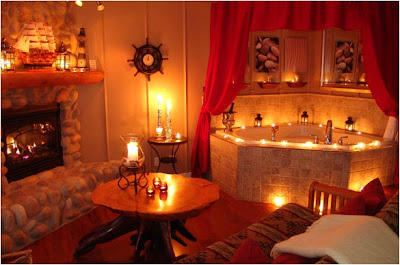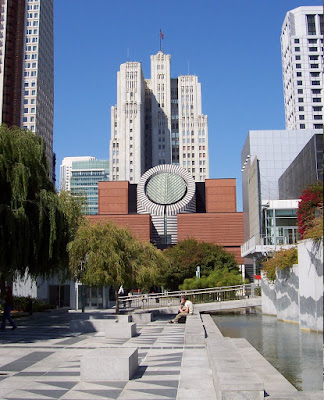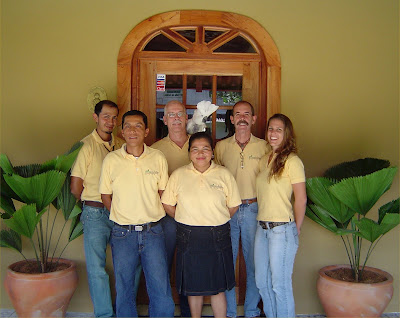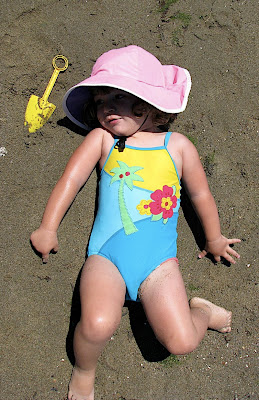After only half a day back in Costa Rica (I spent a week here in 2004) I am reminded of the incredible beauty of this country, the openness of the people and the innocent quirkiness of the culture. It´s the Pura Vida! I had forgotten how different it is from Panama. How can it be right next door and yet so different in every way? Ahh, Costa Rica, how I´ve missed you.
I boarded the Panaline bus at eleven o´clock at night, catching it at the El Valle entrance on the InterAmericana, where it made a special stop for me. Tracy was already on the bus and had reminded the driver to stop there. The bus was huge, dark and cool, but when I boarded the light came on and the sleepy passengers - who had all boarded 90 minutes back at Albrook - squinted at me in annoyance. The bus was perhaps one quarter full, so I took two seats and made myself comfortable. The bus was so dark and I surprised myself by sleeping comfortably.
I woke up to find the bus empty, except for myself. I asked the driver where we were and he said, ¨La frontera!¨The border. I was amazed that I had slept through most of an eight hour bus trip, but annoyed that Tracy had not awakened me when we arrived. He´s done this border crossing before, I haven´t. I hurriedly got my things and the Panaline trip manager, a young woman named Leydis, directed me to the immigration line.
I´ve heard horror stories about the Paso Canoas border crossing, but it wasn´t so bad. Perhaps those people who complain so bitterly have not lived or travelled extensively in the third world and aren´t used to the way things are done here. Wait in one line, get some papers stamped, wait some more. So what, big deal. I listened to my iPod, read a book, stretched my legs.
So, yeah. You wait in line at Panama immigration, get your passport stamped, then literally walk a few hundred meters up the road and you´re in Costa Rica. You walk into the immigration station there, and in our case they weren´t open yet, so all the bus passengers sat or stood waiting for perhaps an hour. I saw one of Corrin´s friends there, a woman named Isabel. Small world, small country. When the agents arrived they stamped our passports, gave our bags a perfunctory search and we were on our way.
Leydis the trip manager was very helpful through the entire process. She noticed my name on my passport and said, ¨Abdel!¨ I said, ¨Yes?¨ She said, ¨Are you Arab?¨¨Yes,¨I replied,¨and?¨ ¨Nothing.¨ ¨Are you Arab too?¨I asked her. ¨No.¨ ... I thought for a moment... ¨Your boyfriend is Arab?¨ ¨My old boyfriend,¨she replied. ¨Same last name as you. Are you Jordanian?¨ I told her no, that my ancestry is Egyptian. She kept up a conversation with me all through customs on both sides, trying out some of the Arabic words that she had learned. Tracy really liked her and as he always does, imagined how it would be if he were dating her. "I´d have to move to Paso Canoas" he said. As for me, my mind is in other places, thinking of my future and what it will bring, and also just enjoying the experience of doing something new.
Immediately upon passing into Costa Rica the difference is striking. Southern Costa Rica is so lush, so overwhelmingly green. The Pacific side of Panama is mostly clear cut and is now agricultural land or cattle country, but Pacific Costa Rica is heavily forested, even in the farm areas. Lovely rivers and streams race across rocky beds on their way to the gulf. Small towns roll by but the natural beauty is persistent and immediately seductive.
Our plan was to disembark at Ciudad Neilly and take another bus to San Vito, a small town high in the mountains. I had read about San Vito in the guidebook and it sounded like a cool place (literally) to spend a few days. At 700 meters elevation it is even higher than my home town of El Valle de Anton. Founded by Italian immigrants, San Vito supposedly has some of the best pizzas in Costa Rica. I was looking forward to finding out.
I was nodding in and out of sleep and at some point I realized that we had just passed a large town called Rio Claro. I looked at my map. We had passed Ciudad Neilly. We had gone too far. I asked the driver to stop and he let us off at a bus shelter in a forested area with few homes. The sun was bright and warm, the wooden shelter was clean, and the narrow road disappeared into the endless green in each direction. There was some graffiti scrawled into the shelter, but instead of dirty words there were geometrical diagrams... some schoolboy practising his lessons? There were several women waiting at the shelter, including a young woman of classic Spanish beauty, with aquiline features and wearing a simple long white skirt and brown blouse. Buses passed occasionally going in the other direction and I noticed every man on every bus craning their necks to look at the young woman sitting next to us. One man stuck his head out of the window of a bus and made funny faces, and the woman laughed. An old man approached the bus shelter and said good morning, and everyone in the shelter replied, ¨Good morning!¨¨How are you all?¨the old man asked and everyone answered in chorus, ¨Fine, thank you, how are you?¨ This is Costa Rica, you see. Land of the pura vida.
Finally the bus arrived to take us back to Ciudad Neilly. It was full and I had to sit on the entrance step. A woman boarded selling bags of plantain chips and pork rinds. She had a large bottle of hot sauce and a bottle of lime juice. Customers chose their poison and she squirted a large helping of sauce or juice into the bag.
Another vendor was practically a walking kiosk. His long sleeved shirt was strung with goods of all kinds. He went to the front of the bus and in a loud voice began proclaiming and promoting his wares. Skin cream to cure any acne problem. A herb called cat´s claw that would soothe any stomach disorder. Indian soap for natural beauty. Hair scissors, leather scissors, pocket knives, nail clippers, pens, cell phone cases, key chains, toys, even a back scratcher. All this came off his shirt or out of his pockets. He sold a nail clipper and a few other items and disembarked at the next stop.
Ciudad Neilly is a lively small town with two or three commercial streets at odd angles. We took a taxi to the Hotel Andrea. Both the bus and the taxi were $1 each. The Hotel Andrea is the nicest hotel in Ciudad Neilly. A large, Spanish style hotel with two stories, it´s $40 per night for good rooms with AC. We made a reservation for Wednesday night, which should be our last night in Costa Rica, then went to the restaurant for breakfast. Omelettes and pancakes, not very good but passable. Afterwards we walked to the bus station which, it turned out, is only a block away.
The bus to San Vito was leaving in one hour. Fare, 600 colones, about $1.20. The station was very busy, with dozens of people waiting for buses going in five or six different directions. A small covered mercado abutted the station and I walked about, passing time. Many small sodas, as they call these tiny local eateries here, and a few clothing stores. I seemed to be the only foreigner in the area and I got a lot of looks. I also saw several Guaymi women in traditional dresses. I had not realized that the Guaymi tribe was so prevalent in southern Costa Rica, but looking at the map later I noticed several Guaymi reservations.
An old woman selling bags of piva fruit (a small, nutty flavored and soft fleshed fruit) persistently tried to convince me to buy some. Finally I told her honestly, ¨I don´t like them.¨She was offended by this. ¨Don´t like them!¨she huffed. ¨Eat them with mayonnaise.¨And she walked away.
We boarded the bus to San Vito and immediately proceeded to climb, climb, climb. The bus rose slowly on a steep, winding mountain road that ascended through stunningly beautiful cloudforest. Soon there were views all the way to Panama in one direction, and the gulf in the other, and then beyond the gulf to the ocean. At one point the road was confined to a ridge with immense drops on either side. The bus was very large and had trouble navigating the gravelled and potholed road. At one point we rounded a curve and came face to face with another large bus. Both buses backed up meter by meter until there was enough room to pass. At times I gripped the seat in front of me tightly, as if that would save my life if we tumbled over the mountain. Soon the air became cool and damp, and the forest disappeared, replaced by cattle land and coffee plantations.
The 33 kilometer trip to San Vito took almost two hours. San Vito itself is a true mountain town, with a small public square in the center and from there five main roads climbing or dropping steeply, each road rising and falling as it curves through town. It´s a surprisingly large town. There are no population signs, but I saw at least six banks, dozens of clothing stores, three large pizzerias, a huge church with a large grassy compound and outlying buildings, a well-equipped grocery store and much more. Also many motorcycle shops. They love their motorcycles and pizza here. Must be the Italian blood.
My hotel, El Ceibo, is at the end of a gravel driveway coming right off the center of town. Surprisingly, it´s very quiet and in fact is backed by forest and a fast running stream. The room is cool without AC, and has a small balcony that looks out onto the forest. At $40 per night it´s a bit pricey but is undoubtedly the best hotel in town and is quite nice. Since I am a traveller I combined the Dhuhr and Asr prayers, guessing at the direction of the Qiblah, then Tracy and I went to one of the pizzerias for a late lunch. It was delicious, with spicy tomato sauce, plenty of cheese, and loaded with broccoli, mushrooms, tomatoes and onions. Better than any pizza I´ve had in Panama, and the small was large enough that I only ate half and took the rest back to the hotel for lunch tomorrow. Tracy had a very meaty pizza with chorizo, pepperoni and ham... ugh.
One thing I don´t see in San Vito: foreigners. Aside from Tracy and myself, I have not seen a single gringo, Chinese, Arab or any other foreigner. Very unlike Panama in that respect. The population seems to consist universally of slim, fair-haired, attractive locals. I have not even seen any indigenous people here and I wonder why. Do they live only on reservations? I get a lot of looks as I walk about town. Sometimes entire groups stop and watch as I walk past, not at all in a hostile way, but more like, ¨Oh look, a stranger!¨ Occasionally someone asks me if they can help me find something. No one would do this in Panama.There are no restaurants selling ethnic foods other than Italian and local Tico dishes. Also no call center, which makes sense in a town with no tourists, but I was really hoping to find one. Tomorrow I´ll see if I can purchase a phone card and use a public phone, though talking to Salma without a webcam won´t be the same.
Reading this, I realize now that I have not done a good job explaining what it is about Costa Rica that I love so much. There are so many things, but let´s forget about the stunning landscape for a moment and talk about the pura vida. In the USA when you walk into a store the clerk smiles and offers to help you because that´s what they are trained to do. In Panama they simply gaze blankly. In Costa Rica they smile and help you because they are genuinely interested and friendly. People greet one another in street heartily, and beyond that they are genuine. Costa Ricans don´t wear masks. They laugh, talk, joke, flirt, and they do it all honestly and openly, without pretense. Perhaps because they have been a stable democracy for so long, with no military and no wars, they have forgotten how to mistrust. Their lives are simple.
Sure, there is crime in the cities and in San Jose yóu´d better watch your bags, and you could even get mugged. On the other hand I´ve had someone stop and offer me a ride because he was concerned that I was walking in a bad neighborhood.
And the landscape is part of it too. Costa Rica has done a better job preserving their forests than any nation in the world, because to the Ticos the land is precious, it is pure and therefore a part of the pura vida. Sure, the roads here are potholed, high speed internet is rare outside of the major cities, and poverty exists. But the pura vida enriches everyone.

 Wow. Wouldn’t that be something. During the day I’d be in San Francisco, maybe exploring the incredible bounty of new restaurants that are giving flavor to the Union Square/Tenderloin area. Union Square itself has been renovated and is now an inviting open space in a uniquely San Franciscan style. Yes, the Tenderloin retains its dangerous edge, but it’s changing. There are Indian, Pakistani and Thai restaurants everywhere, along with cafes, edgy art galleries, smoke shops, and corner ethnic grocery stores (not liquor stores but real grocery stores). And this is considered one of the worst neighborhoods in The City!
Wow. Wouldn’t that be something. During the day I’d be in San Francisco, maybe exploring the incredible bounty of new restaurants that are giving flavor to the Union Square/Tenderloin area. Union Square itself has been renovated and is now an inviting open space in a uniquely San Franciscan style. Yes, the Tenderloin retains its dangerous edge, but it’s changing. There are Indian, Pakistani and Thai restaurants everywhere, along with cafes, edgy art galleries, smoke shops, and corner ethnic grocery stores (not liquor stores but real grocery stores). And this is considered one of the worst neighborhoods in The City! I’d walk down the main road and stop in at Carlitos and Veronica’s Galeria to say hello and admire the original handcrafts for sale there. I’d buy a candy bar at the pharmacy next door (they have the best selection of chocolate bars in town), and walk further to the Mercado. There I would visit with my friends Cleo and Niko, both of whom are crafts vendors, and enjoy some fresh fruit. I’d go for a short hike in the hills around town, or just a pleasant stroll beneath the mango and acacia trees. I’d check in on Zach & Danyelle and Rudy & Christina and see how their home construction projects are going. I’d drop by my own house and make sure Marina and Alex, my friendly Russian tenants, are happy, and I would see how my home improvement projects are progressing.
I’d walk down the main road and stop in at Carlitos and Veronica’s Galeria to say hello and admire the original handcrafts for sale there. I’d buy a candy bar at the pharmacy next door (they have the best selection of chocolate bars in town), and walk further to the Mercado. There I would visit with my friends Cleo and Niko, both of whom are crafts vendors, and enjoy some fresh fruit. I’d go for a short hike in the hills around town, or just a pleasant stroll beneath the mango and acacia trees. I’d check in on Zach & Danyelle and Rudy & Christina and see how their home construction projects are going. I’d drop by my own house and make sure Marina and Alex, my friendly Russian tenants, are happy, and I would see how my home improvement projects are progressing.




























